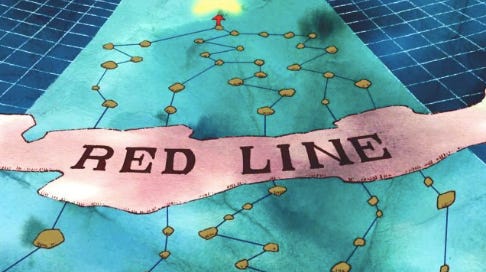From Globalization to the Rise of New Empires
In a multipolar world, simply spreading your bets isn't enough; there are those who innovate and learn, and those who don't. The difference? Monumental success or profound disappointment.
Short: Bonds, Long: Technology and Commodities.
The closing decades of the 20th century witnessed not just a change, but a revolution in the global order. With the fall of the Soviet Union, almost by happenstance, the U.S. rose to the role of a global hegemon. Its military prowess spread across vital trade corridors, not just facilitating trade but exerting a newfound mastery over world geopolitics. As American influence became omnipresent, transaction costs decreased, inflation took on predictable patterns, and bond markets maintained low volatility. At this juncture, a deep-seated faith in global entities and governments emerged, marking the era of "Pax Americana."
For a sweeping four decades, stability was the cornerstone of global dynamics. The trajectory of progress seemed reliably linear. In the realm of finance, diversification became the guiding principle. Identifying the next successful company was like seeking a lone star in an expansive galaxy. Yet, a strategy that diversified investments across this vast expanse emerged as the ideal for steady growth.
The economic dynamism of this era revolved around integrating innovations and time-tested institutional systems into fresh territories. Globalization didn't merely touch emerging economies; it settled in. These nations, abuzz with prospects, transformed into the hotbeds of novel investment approaches.
But history, as it always does, evolves. Our perspective suggests we're on the brink of a significant shift. The world is no longer a platform for a single protagonist. We're moving towards a multipolar arena, with China stepping forward, keen to share the spotlight with the U.S. Enhancing this story are emerging giants like Russia, the Eurozone, Japan, India, and Saudi Arabia. Investing amidst this shift demands astute precision. As the steadfast trust in global institutions wavers, we're witnessing erratic inflation and a multi-decade bear market in bond markets.
Bond Bear Market since 1941-1980. Source: St Louis Federal Reserve.
In a multipolar world, simply spreading your bets isn't enough; there are those who innovate and learn, and those who don't. The difference? Monumental success or profound disappointment.
Reflecting on the 19th and early XX century, we find a compelling parallel to our current era. The British Empire, in all its splendor, contended with rising forces such as Prussia, Tsarist Russia, the Austro-Hungarian Empire, the Ottoman Empire, and an emerging United States. Concurrently, a technological renaissance was underway, with interconnected innovations heralding profound change. Only a handful of nations capitalized on this transformative phase, highlighting the vulnerability of even the most formidable.
Nobels, Rothschilds and Rockefeller
Robert Nobel, brother of Alfred, the founder of the Nobel Prize, made a bold move, investing not just in tangible assets but on the trajectory of the future. Placing faith in Baku's prospects, he laid the groundwork for Branobel. Its initial 200,000 ruble investment represented more than mere currency; it was a belief in the energy of tomorrow—a venture many deemed wildly impractical. But often, genuine progress initially seems implausible.
Yet Branobel was not alone in its aspirations. Rothschild's Caspian & Black Sea Petroleum was a daunting adversary, challenging every step Branobel took in this burgeoning field. On a wider scale, the British Empire, with its influence stretching continents, championed its cause. Companies like Anglo Persian and Shell symbolized more than business endeavors; they were emblems of geopolitical ambitions, with oil as their instrument.
Across the Atlantic, the U.S., exemplified by the rise of the Rockefellers, charted its own energy narrative, unhindered by long-standing Eurasian conflicts.
This time signaled the fragmentation of a world once under British rule. New contenders emerged, driven not just by politics but by a nexus of technological marvels. The era wasn't only about oil; it encompassed electricity, automotive advancements, and pivotal societal shifts. Innovators and investors like Tesla, Edison, J.P. Morgan, and Westinghouse melded seamlessly with industries, exemplified by Ford's automotive breakthrough.
Yet, history serves as both a guide and a cautionary tale. The Nobels and Rothschilds, with all their foresight, couldn't predict the forthcoming political quakes, such as the Bolshevik Revolution or the World Wars. Similarly, in a world often plunged into darkness, who could've foreseen America's automotive surge?
Today, standing at a pivotal historical intersection, we are guided by past lessons. The fusion of technology and geopolitics perpetually molds our environment.So, as we gaze into the vast horizon of investment opportunities, the pivotal question isn't about who's leading the race today. Instead, we must ask: Which enterprises or countries have the mettle to stand the test of time and still be relevant in the next decade?.
In markets, as in nature, adapting and learning from our mistakes is the key to enduring success.
Thanks for reading,
Guillermo Valencia A
7th September, 2023
Brazil





